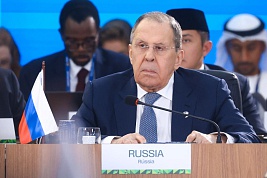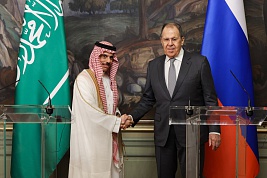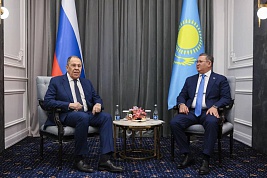Foreign Minister Sergey Lavrov’s opening remarks at a meeting with representatives of Russian and German business circles on the sidelines of the Munich Security Conference, Munich, February 17, 2018
Mr Buchele,
Mr Gabriel,
Friends,
First of all, I would like to congratulate German Foreign Minister Sigmar Gabriel on an important event in Germany’s foreign policy activities, that is, the return of a German journalist. Yesterday, we were pleased to observe this step, which will obviously help improve relations between Germany and Turkey. We welcome this in every way.
Thank you for this tradition. We have gathered in this room and at this table on many occasions. In our opinion, it is a bit too early, but this is quite all right, and it is better to start work earlier than planned.
We agree with assessments that have now been provided by Wolfgang Buchele. Despite our different approaches towards a number of political issues, it is our opinion that our relations should, nevertheless, hinge on the real and fundamental interests of Germany and Russia, so that politics will never prevail over the economy. On the contrary, expanded economic ties should create a solid foundation, on which it will be easier to resolve various disagreements on certain international situations.
As far as I know, officials of the Russian-German Chamber of Foreign Trade have recently polled German companies on their readiness for new large-scale investment in Russia. Their interests were estimated at about 500 million euros. This is quite a lot, considering the substantial volume of investment already being received by the Russian Federation. We will continue to do everything possible to help businesses, including German ones, feel comfortable in Russia.
We realise that the so-called spiral of sanctions, initiated by the United States (Mr Buchele has directly said this), is the main obstacle hampering business cooperation. Europe is forced to pay its bills. Yes, this is so. But it is also an objective fact that people are coming to comprehend the abnormal nature of this situation. We realise that economic interests are at stake here. The Americans do not conceal the fact that they want to promote their own interests, primarily under the pretext of containing the Russian Federation. The Federal Chancellor and a number of other countries whose companies perceive this project’s purely commercial and useful essence are voicing their clear position with regard to the Nord Stream 2 project. But it is important to remind those trying to “torpedo” the project that the pipeline route’s length between Yamal and Germany is 2,000 kilometres shorter than the current pipeline reaching into Germany via Ukraine. Gas transit costs will also be about half of current levels. Therefore, the project’s commercial and economic benefits are absolutely obvious. I am confident that the final decisions of countries neighbouring Germany will hinge on precisely these considerations.
We meet regularly. Last autumn, President Vladimir Putin met with representatives of the German business community in Sochi. Many of you were present there. Quite recently, he held a similar meeting with French business managers working in Moscow. In October 2017, I met once again with members of the European Business Association in Russia. We hold annual meetings. I see the normal, concrete and pragmatic mood of virtually everyone linked with the Russian economy, one way or another, and implementing their own projects in this country.
Negative trends in our trade are being gradually rectified. In2017, the volume of Russian-German trade increased by more than 20 per cent and reached $50 billion. The Russian-German Interdepartmental Working Group on Strategic Economic and Financial Cooperation Issues, an auxiliary inter-governmental mechanism, functions pretty well. The Group resumed its active work in September 2017 in Berlin. I would also like to note that the Bavarian-Russian working group for promoting economic cooperation has been established. A similar group involving Russia and Germany’s Mecklenburg-Vorpommern federal state is to launch its practical work in the near future.
It goes without saying that top officials of our foreign ministries are involved in regular discussions of economic issues, including at the November 2017 Petersburg Dialogue Russian-German Public Forum held in Berlin, that was attended by a number of both countries’ ministers.
State-of-the-art technologies were also mentioned. In September 2017, Hamburg held a ceremony marking the launch of an X-ray free-electron laser under the XFEL project. Russia is Germany’s key partner in this project. The Ministry of Education and Science and our German partners are drafting a road map concerning long-term scientific and technological cooperation. In June 2017, Mr Gabriel and I opened the Year of Regional and Municipal Partnerships in Krasnodar, and the programme of the Year’s events expires in mid-2018. There is a proposal by our researcher colleagues to dedicate the next year to cutting-edge technology. I believe that this will also be quite useful and effective.
Regarding elections, Mr Buchele said that elections have already taken place in Germany, and Russia is to hold them quite soon. However, I have not heard about any in-house elections at your companies. But everything probably lies ahead. In any event, I repeat, all of you aspire to expand cooperation on the basis of real interests, which was confirmed today. We don’t want this cooperation to be marred by any ideologised and external considerations.
Thank you for this opportunity, and I am very happy to see you all here today.


